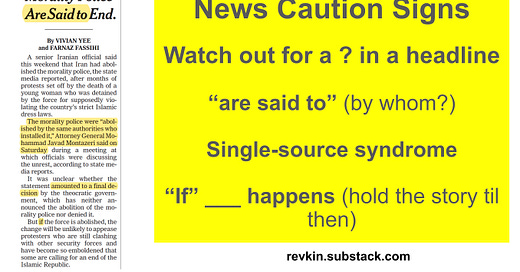Handling Headlines That Seem Too Good to Be True - Whether on Morality Police or Climate Collapse
Tips for readers and editors when headlines or memes tug at our instincts
This post on how to avoid being fooled again and again online, was originally published December 5, 2022, and is (sadly) perennially relevant.
Raising my head up above my daily fixation on sustainability questions, I caught up with what seemed extremely welcome news from Iran, as conveyed by The New York Times Sunday morning in an online story with a definitive headline and deck and this breathless Twitter post:
Breaking News: Iran has abolished its morality police after months of protests set off by the death of Mahsa Amini, a young woman who was arrested over the strict Islamic dress code.
A flood tide of rebuttals and criticism poured in via Twitter and other social media platforms from Iranian journalists and activists. A particularly striking and compelling Twitter thread was posted less than two hours after the story “broke” by Nahayat Tizhoosh (@NahayatT), a producer at CBC News Network's Power & Politics show:

By Sunday noon, the Times’s social media output was adding caveats. The Times story was largely framed around a single statement from an Iranian official on Saturday. Nearly 900 reader comments were posted and Twitter pushback remained relentless.
The story and headlines became far more nuanced by this morning, with the Times headline and deck midday today reading this way:
Iran Has Abolished Morality Police, an Official Suggests, After Months of Protests - The move, which the government did not confirm, might be a concession to the protest movement that erupted after the death of a young woman in the custody of the morality police.
What to think when a headline ends in a ?
The version of the Iran story that ran in print Monday holds clues and key words that readers can watch for if they want to avoid - and avoid worsening by sharing - the surges and ebbs around consequential issues like widespread campaigns within Iran to end heinous practices. Or the latest ”doomsday collapse coverage of ice sheets. Or pandemic pandemonium. Or…
I only became aware of the pushback on this coverage of Iran’s continuing human rights crisis because I paused before sharing the news to sift for some other context.
This habit requires building a few extra seconds into your news-ingestion regimen. It takes practice, almost like calisthenics (which I’m bad at) and is hard - as is becoming a wiser spouse or parent, where taking a moment to breath and reflect always comes in handy before reacting.
Tips for avoiding information whiplash
When I taught Blogging a Better Planet at Pace University from 2010 through 2016, a standing assignment for students was to submit a “backtrack journal” - taking some item that crossed your screen and tracing back its roots. I was glad to see that concept spread around a bit after I wrote it up, as in this tweet from online publishing pioneer Tim O’Reilly:


Pause before sharing
Pausing before sharing is a similar practice.
I try to sustain this habit in part because of times when I failed to pause and screwed up, as in 2017 after Hurricane Harvey swamped Houston and I shared a photo of flooded planes on a tarmac.


Watch out for that narrative!
We’re all captured by narratives, some of which we manufacture internally, while others are artfully designed to capture our attention or money or favor through marketing or propaganda taking advantage of both our human tendencies and the practices of our trades. Journalism, particularly, faces enormous, constant challenges in weighing how to handle new developments around consequential issues and events. I created a warning sign for this. Feel free to download and deploy it!
Check that “front-page thought”
A newsroom can get captured by narratives of its own making. I was immersed in that tussle in the months I spent as part of The New York Times team tracking the investigation into the midair explosion of TWA Flight 800 off Long Island in 1996. I’ll be writing more about lessons from coverage of that disastrous crash, which ended up the result of some complex interlacing of technical failures, not a bomb or missile. I alluded to this case study in a Sustain What webcast and post on, yes, UFOs. Listen to an excerpt in this tweet:

Longtime news standards require multiple sources or lines of evidence confirming substantial developments. But this is the age of the Instanet (see my 2008 Dot Earth post), with newsrooms and online editors in desperate competition for public and policymaker attention constantly sifting for “the front-page thought” - the nugget that will get attention.
I can’t imagine what the dynamic would have been around the TWA crash if Twitter existed in 1996.
Why readers have to take action
Don’t expect the media to get this right any time soon.
After I tweeted about the shifting Iran coverage in The Times, a Twitter contributor @Spikels, self described as “an online trust and safety expert,” asked a question worth answering:
Curious if you think the quality of reporting has declined in recent years or if was always bad but we had no venues like this to critique? I think it is a combination of both (always had weaknesses and even more biased today) but Internet is subjecting it to more scrutiny.
Both. #Instanet competition for clicks and the spotlight torques newsrooms toward turning incremental developments into "stories." The feedback process, as here, is vastly amplified from the days of "letters to the editor." But always playing catchup.
Here’s a bit more. The structural realities of shriveled newsroom expertise and resources and business models built around “first-ism” and eyeballs are as tough to shift and those around fossil-dependent energy systems.
That means readers who care about reality do need to develop and share skills that can help both you and your friends and contacts (by pausing before sharing) and help newsrooms get things a bit less wrong (by offering active, substantive feedback like that flood of Iran-focused pushback).
This issue exists to different extents around every contentious or urgent question.
Beware of “Single Study Syndrome”
Click here for a post including a section on breathless headlines built around a single study hinting that global warming was finally causing a key part of the Atlantic Ocean circulation to break down.
Read my past output on the bad media habit - #singlestudysyndrome.
I’ll be posting and running more Sustain What webcasts around these themes and would happily include your experiences and insights.
Mind over media
A fantastic guide for avoiding regrets as a media consumer and sharer, as I’ve mentioned before, is Renee Hobbs, who teaches propaganda literacy at the University of Rhode Island and has twice been a guest on my Sustain What show. This one was particularly great: Thriving Online: An Expert in Propaganda Reveals How to Put Mind Over Media.









Great advice. I often try to tell friends and students who engage in frenzied forwarding that if you have the urge to forward a breaking news tweet, think about the fact that whether it seems like a wished-for miracle or a disaster, it’s likely to be news not yet confirmed.
I've been actively resisting being stampeded by the news. Latest example was the Dalai Lama story which appears to be about sexual abuse, "eat my tongue," but turns out to be an expression of elder generosity within Tibetan culture: https://www.elephantjournal.com/2023/04/the-tibetan-meaning-of-eat-my-tongue-dalai-lama/
The older I get the less sure I am about anything in the news except for realizing, as the song goes, "only a fool and their capers get a name in the papers."
Don't hear many newspeople these day repeat that old saw, "If your Mother tells you she loves you, find a second source" or, as another song puts it, "Nobody loves me but my Mother and she could be jiving too: https://www.youtube.com/watch?v=qvOMYu5EeHs